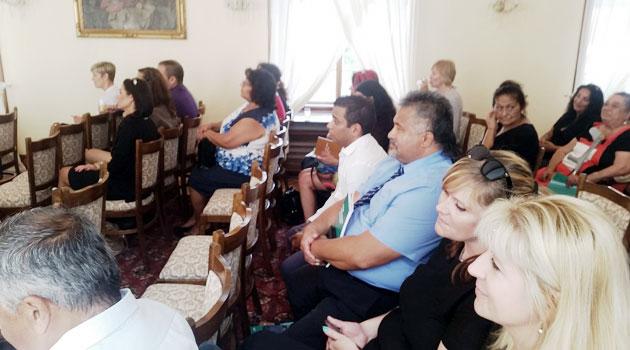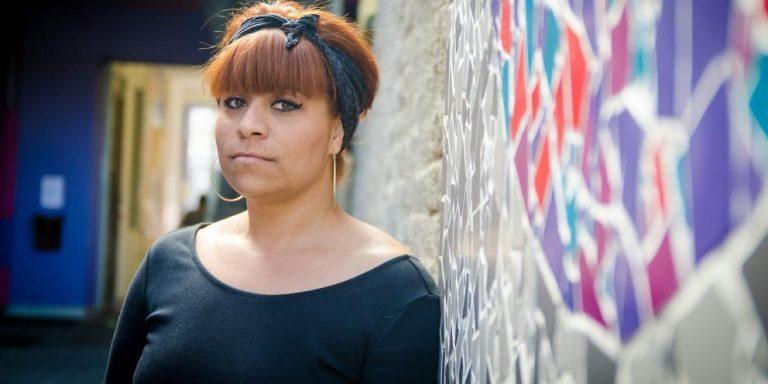Romani people tell Czech Government their issues are all interrelated

On 26 July a meeting was held at Hrzánský Palace in Prague between Radek Jiránek, the director of the Czech Government Agency for Social Inclusion, the Minister for Human Rights, Equal Opportunities and Legislation Jiří Dienstbier, members of the Czech Government Council on Roma Community Affairs and representatives of Romani civil society. The meeting opened with Jiránek declaring that the “Romani Integration Strategy adopted by the Government in February 2016 differs from previous strategies because it focuses on the emancipation of Roma and supports the development of their culture and language. Romani people have moved from a position of being clients into the role of empowered persons.”
Together with Martin Martínek, Department Head of the Office of the Czech Government Council on Roma Community Affairs, the Agency director gave a presentation about Government measures in the area of Romani integration and social inclusion, sketching what the Romani Integration Strategy to 2020 and the Strategy for Combating Social Exclusion 2016-2020 have in common and where the two strategies augment each other. “The Agency has adopted a new coordinated approach and is currently collaborating with 41 localities,” Jiránek said.
He and Martínek also lectured on the other aims and areas that the Agency is involved with. “We are focusing, for example, on debt relief for Romani people, on increasing their financial literacy,” the Agency director told those assembled.
Emilie Horáčková: How many Romani people do you yourselves employ? Why do you collaborate with racists?
A lively debate about the fulfillment of these strategies began right away. “The success in fulfilling a strategy is not determined by the amount of the budget allocated to it, but by whether the people in this society comprehend its purpose or not. If they don’t get what this is about, then even billions wouldn’t be enough,” warned Karel Holomek, a Romani civil society member of the Czech Government Council on Roma Community Affairs.
Emilie Horáčková, a Romani resident of the Liberec Region, expressed uneasiness over the fact that not enough Romani people are actively involved with the Agency. “We want to know how many Romani people you employ and how you will be involving us in your planned activities,” she told Jiránek.
Cyril Koky, also a Romani member of the Czech Government Council on Roma Community Affairs, expressed a similar opinion about the Agency’s work. “Romani people must not be missing from the Local Partnerships – if they’re not there, that is an error on the part of the local partner,” he said.
The Agency director responded by saying the doors are open. “We are doing our best to also involve local Roma in the Local Partnerships,” he said.
Horáčková, however, questioned why the Local Partnership in the town of Ralsko includes the Lampa organization, which is connected with the “Bloc against Islam” group and criticizes the activities of the Agency and of Minister Dienstbier. “How can you collaborate with racists?” she asked emotionally.
“I disagree with the remarks that have been made by Mr Hanzl of the Lampa organization, but it is not within the Agency’s powers to exclude anybody from a Local Partnership. We don’t have the power to audit the members in any way, but you can turn to the Regional Authority or the Police of the Czech Republic about this,” Jiránek said in response to the criticism.
Růžička: How can you expect to communicate with Roma when the pig farm is still standing on the Lety Holocaust site?
One of the basic problems that Czech society has not yet managed to address is the pig farm at Lety by Písek that is located on the site of a former concentration camp for Romani people. “As long as the pig farm continues to remain in place there, how can you expect to communicate with us?” asked Čeněk Růžička, chair of the Committee for the Redress of the Roma Holocaust.
“If you remove [the pig farm]it, you will open up the way to the Roma,” Růžička predicted. Holomek then reminded those assembled that the Government has invested CZK 90 million [EUR 3 330 000] into building a memorial to the victims of the Romani Holocaust at the site of another former concentration camp for Romani people in Hodonín.
Another topic raised was the need for local-level Romani advisors. “Establishing advisor positions is included in the Strategy too. Within the next year we will be doing our best to find the funds to establish them together with the Union of Towns and Municipalities,” Martínek informed those present.
Should the Agency for Social Inclusion collaborate with Vsetín?
Dienstbier joined the debate in the afternoon and highlighted the importance of the upcoming social housing legislation. “We hope that law will take effect during this electoral period and eliminate the trafficking in poverty that is going on today,” he said.
Even though the Agency already collaborates with almost 100 municipalities, that collaboration was described during the discussion as frequently complicated. “You have the power, you can reach agreement with the municipalities,” Růžička pointed out to the Government officials.
“When a local government doesn’t want to collaborate with us we don’t give up immediately, we try to work with them,” Jiránek responded. The question remains whether to establish such collaboration at any cost, even in controversial cases like that of the town of Vsetín.
Responding to that issue, Dienstbier said the following: “We weren’t certain whether it would be worthwhile to work in areas where there is no political will,
but we have decided to go into that more complicated terrain also. We are interested in reforming the sinners too. Mayor Čunek is not the only person in Vsetín, there are other people there as well who can profit from such collaboration.”
Dienstbier: Inclusion in education, potential of social enterprises is enormous
The discussion then turned to the area of educating Romani people, where the path toward inclusion must now be established and billions of crowns have been allocated for that. The most complicated area, however, was said to be employment.
“One option for making progress [in employment] is adopting a law on social enterprises and a proposal for one is now being drafted. Its potential is enormous – in other countries it functions much more than here, but it’s just one of the routes to take,” Dienstbier said.
“A significant instrument for combating discrimination will also be the law on free legal aid and we will be discussing a draft of that as well,” he added. Those in attendance expressed agreement with the fact that the question of Romani inclusion is a complex topic that touches on more than one area and that its resolution is a long-term process.
Systematic work in this area was said to be essential. “Doing the daily chores, as the founding father, Masaryk, used to say,” Holomek noted.
Minister Dienstbier said he, too, is convinced this process will take a long time: “We must gradually, persistently change conditions – we can’t just run an
advertising campaign to eliminate prejudice. What is necessary is commitment, good will, and a gradual transformation of the social atmosphere.”
Those attending on behalf of the Office of the Government of the Czech Republic besides Dienstbier included David Beňák, representing Deputy Human Rights Minister Martina Štěpánková, who manages the Human Rights Section, as well as Head Expert Aleš Ziegler and Central Expert on Housing Issues Roman Matoušek from the Agency for Social Inclusion. Around 50 guests from all over the Czech Republic attended the meeting on behalf of the Romani minority, including leading Romani community members, representatives of Romani nonprofits, and representatives of organizations implementing projects focused on Romani community work, as well as municipal representatives.
